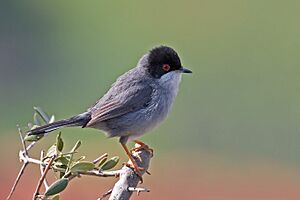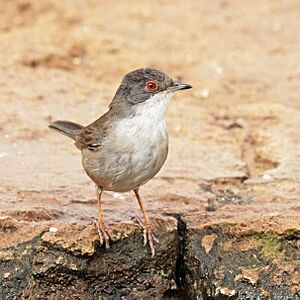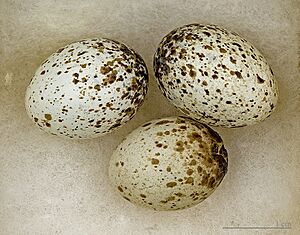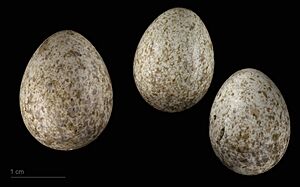Sardinian warbler facts for kids
Quick facts for kids Sardinian warbler |
|
|---|---|
 |
|
| Adult male, Methana peninsula, Greece | |
 |
|
| Female, Souss-Massa National Park, Morocco | |
| Conservation status | |
| Scientific classification |
|
| Kingdom: | Animalia |
| Phylum: | Chordata |
| Class: | Aves |
| Order: | Passeriformes |
| Family: | Sylviidae |
| Genus: | Curruca |
| Species: |
C. melanocephala
|
| Binomial name | |
| Curruca melanocephala (Gmelin, JF, 1789)
|
|
| Subspecies | |
|
2-6, see text |
|
| Script error: The function "autoWithCaption" does not exist. | |
| Synonyms | |
|
Sylvia melanocephala |
|
Script error: No such module "Check for conflicting parameters".
The Sardinian warbler (Curruca melanocephala) is a common bird found all around the Mediterranean Sea. It's a type of warbler, which is a small songbird.
Male and female Sardinian warblers look different. The adult male has a grey back and white belly. Its head is black, and it has bright red eyes. The female is mostly brown with a grey head. The Sardinian warbler's song is fast and sounds like a rattle. It's a very common sound in the Mediterranean areas where these birds live.
Template:TOC limit=3
Contents
About the Sardinian Warbler
How Scientists Name Birds
Scientists first officially described the Sardinian Warbler in 1789. A German scientist named Johann Friedrich Gmelin gave it its first scientific name. He called it Motacilla melanocephala. This name came from an earlier description by an Italian zoologist, Francesco Cetti, who wrote about the birds of Sardinia.
The Sardinian warbler used to be in a group, or genus, called Sylvia. This name comes from a Latin word meaning "woodland sprite." Now, most scientists place it in the Curruca genus. The name melanocephala comes from ancient Greek words meaning "black head."
Bird Families: Superspecies
The Sardinian warbler is part of a "superspecies" with another bird called Menetries's warbler. This means they are very closely related. Both have white patches on their cheeks and light-colored throats. Adult males of both species also have black heads and a bare ring around their eyes.
Different Types of Sardinian Warblers
The Sardinian warbler has several different types, called subspecies. They look a little different depending on where they live.
- Curruca melanocephala melanocephala (Gmelin, 1789)
- This type lives across southern Europe and western Turkey. It also lives in parts of North Africa. In winter, some of these birds fly to the Sahara Desert.
- These birds are large with long wings. Males usually don't have any reddish color. Females are olive-brown or greyish-olive.
- Curruca melanocephala leucogastra (Ledru, 1810)
- This type lives in the Canary Islands.
- They are medium-sized with short wings and large beaks. Birds from the western islands are darker. Birds from the eastern islands look more like the melanocephala type.
- Curruca melanocephala momus (Hemprich & Ehrenberg, 1833)
- This type lives in the Near East. They usually stay in the same area.
- These birds are smaller with short wings. They often have a reddish color on their underside.
- Curruca melanocephala norissae Nicoll, 1917: Fayyum warbler
- This type lived near the Nile Delta in Egypt. Sadly, it became extinct around 1940.
- They were very reddish, similar to the momus type.
- Curruca melanocephala valverdei Cabot & Urdiales, 2005
- This type lives in Morocco, stretching south towards the Sahara. They usually stay in the same area.
- These are medium-sized birds. They are the palest (lightest colored) subspecies. Males have a dull black cap. Young birds are very sandy-colored.
Where Sardinian Warblers Live
The Sardinian warbler breeds in the southern parts of Europe and into Asia, like Turkey. Unlike many other warblers, it doesn't travel very far. However, some birds do fly to North Africa for the winter. Occasionally, one might even be seen far away, like in Great Britain.
Life and Habits
Sardinian warblers like open areas and farms that have bushes. They build their nests in low shrubs or thorny bushes. A female usually lays 3 to 6 eggs.
Like most warblers, they mainly eat insects. But they also enjoy eating berries and other soft fruit.
Images for kids
 | Dorothy Vaughan |
 | Charles Henry Turner |
 | Hildrus Poindexter |
 | Henry Cecil McBay |






